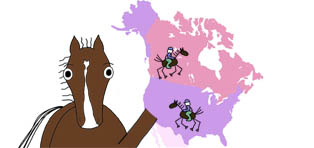The American Equestrian Trade Association (AETA) and Equestrian Land Conservation Resource (ELCR) have formed a partnership that will benefit both riders and the equestrian trade. The Associations - AETA is a non-profit trade association and ELCR is a non-profit educational organization - have agreed to share informational resources and work together to encourage and nurture interest in equestrian activities in the United States. AETA's members, many who are avid riders and landowners, actively support ELCR's mission of advancing the conservation of land for horse-related activity. AETA, as an Association, recognizes that without riders and land for equestrian activities, there is no equestrian trade.
According to the US Department of Agriculture statistics, open space in the US is being developed at the rate of 250 acres per hour. Land once available to raise hay and grain and to raise, train, and ride horses is becoming more scarce, expensive and fragmented as fields give way to rooftops and strip malls. Economic pressures are tempting many landowners to sell farms for suburban and industrial development.
Since its establishment in 1997, ELCR has assisted equestrian sport, recreation and industry in advancing responsible land stewardship and conservation for horse-related activity. The organization educates and facilitates partnerships to preserve access to trails on public and private lands. It provides information on best farm management practices to protect soil and water quality. It provides guidance to both large and small landowners in the protection of open space through conservation easements, the purchase of development rights' programs (PDR's) and community land use and comprehensive planning.
Fortunately, there are better options for horse farm owners than just selling their land to developers. Landowners can receive tax benefits by donating conservation easements with equestrian provisions on their property, or receive payments by entering into a purchase/transfer of development rights. Doing so allows them to conserve their open land and keep or ride horses on their property in perpetuity. These opportunities vary from state to state and even within states. Persons seeking state-specific statutory and regulatory information regarding land trusts should contact ELCR or their local land trust for the most current land conservation tax incentives.
With guidance from ELCR and their local land trusts, communities are conducting comprehensive planning that accommodates appropriate development while keeping prime farmland in equestrian and agricultural use. Many rural areas are opting to preserve their heritage and way of life while accommodating newcomers who have similar interests. Horse owners, horse enthusiasts, and the professionals upon whom they depend are an important component of rural living.
Keeping sufficient land for horses, in terms of both quantity and quality, is vital to a thriving horse industry. The Equestrian Land Conservation Resource is working on many fronts to ensure that future. ELCR welcomes the involvement and assistance of the American Equestrian Trade Association and its members in their conservation efforts.
For more information on ELCR, please call us at 859/455-8383, email info@elcr.org or visit their website at www.elcr.org.

No comments:
Post a Comment